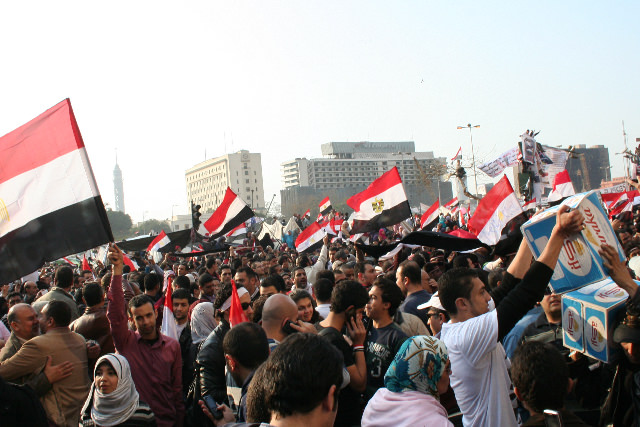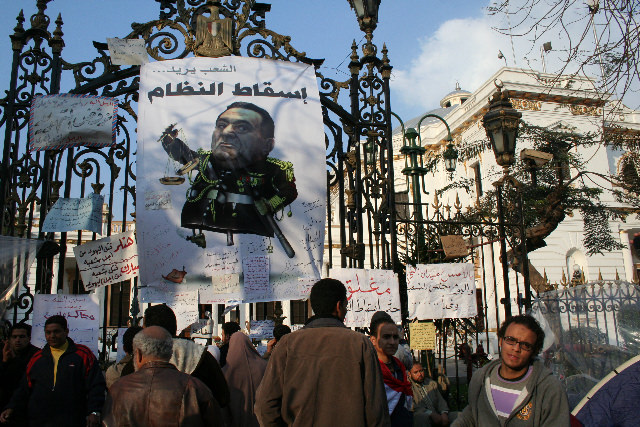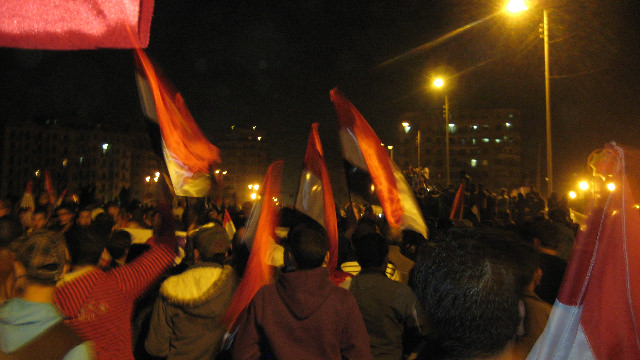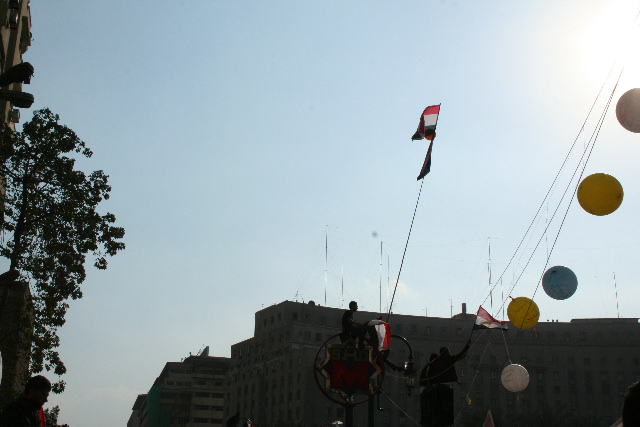It was around 3 PM on Friday that we began to feel it might be over. Earlier, there had been fears of a new government crackdown, as protesters, still seething from Mubarak’s defiant speech and Suleiman’s call for people to go home the night before, had promised to make the eighteenth day of revolution the largest yet. By early afternoon, those worries had faded. The streets had filled with marching, chanting people, and in Tahrir Square the growing crowd seemed to surge with positive energy. Again there was possibility. Mubarak’s speech had been a point of no return, and everyone I knew—even those who hadn’t taken part in the protests until now—said that they would be out calling for his departure after the Friday prayer.
In the square, the mother of Khaled Said—the 28-year-old beaten to death by police last year in whose memory the original January 25 protest had been organized—spoke to the crowd about the Free Egypt they were on the brink of achieving. She spoke of martyrs of the revolution, and held a picture of her son. Young men and women took to the stage and microphone after her, shouting rhythmic chants about commitment to change. Patriotic music blared through speakers, and the square’s teams of volunteer organizers and guards, all civilian, called on the thousands of people pouring into Tahrir to remain peaceful and courteous. “Single file lines,” shouted one young man at one entrance to the square, “come on guys, this is about learning order and respect. Make way for the women. This is the revolution!”
Inside the square, there was barely an inch to move. Everyone it seemed was holding an Egyptian flag or a homemade banner—declaring love for the country, demanding an end to the regime. Here and there, a few Tunisian flags were also waving. On the sidewalks, people had created human shields to cordon off makeshift medical centers and a “committee” area, where at one point, an army officer who had joined the protesters spoke to a crowd of journalists and politicians. The former Coptic MP and opposition party member Mona Makram Ebeid was also crammed in the small space. She had been at the square every day, and felt euphoric. “The end is near,” she said.
Just down the street from Tahrir, by the Prime Minister’s office and the houses of parliament, people were milling around, casually chatting with soldiers. Tents lined the sidewalks, and men and women—students and workers, middle-aged and teenaged, groups of friends and families—hung out, eating and sharing jokes. Someone was handing out roses to the soldiers, and young children sat on the tanks that had been stationed along the square for two weeks now having their pictures taken. A line of Tang-orange ambulances that had been stationed at the ready on nearby Kasr El Nil Street seemed out of place. It was the first day ambulances were at hand in such numbers, and it was also perhaps the first day they weren’t needed.
Overnight, the street art that had started to appear all around Tahrir since last weekend had spread to other areas of the city. On the gates of parliament, someone had hung a caricature of Mubarak and a request to the prosecutor general to investigate the origins of the rumored 70 billion dollar fortune amassed by the president and his family—signed, “the people of Egypt.” From behind the gates, soldiers smiled to the crowds, some accepting handouts of food and cartons of juice. At one point, a plane flew overhead, and everyone looked up, cheering it away, laughing that maybe it was the businessman and regime strongman Ahmad Ezz fleeing the country. “Take Mubarak with you,” they shouted.
I strolled through Tahrir and by parliament with a visiting journalist friend, entering and exiting the many checkpoints with greetings from civilians and soldiers. “I feel like we’ve won,” I told my friend. She nodded, and shook hands with a soldier as we walked past metal barricades that had been pushed aside. There had been mixed reports coming from the presidential palace, and about 4:30 PM we hopped in a taxi to see what was happening there. One news station said there had been tensions between protesters and the presidential guards, but the tweets coming in insisted these were just rumors. On the way over, our driver tuned in to state radio. Mixed in with popular Egyptian music were brief news segments, including one announcing the departure of the Mubaraks from Cairo to Sharm El Sheikh, though it wasn’t yet clear what that meant. At the palace, we found a similar atmosphere as downtown. People were lingering, chanting, and singing—many sharing food. The army’s presence was barely noticed; one soldier sat on a tank reading the paper. There was a dark cloud in the sky over the palace. “It looks angry,” my friend said.
Advertisement
We headed back downtown, and around 6 PM, as we were approaching Kasr El Nil Bridge, the news finally came that Mubarak had resigned. On the bridge the atmosphere was electric. Last week riot police had attacked protesters with teargas and thugs had come out with knives and guns here. Now, people were running across with flags shouting “Egypt, Egypt, long live Egypt.” Others were jumping up and down, hugging each other, pumping their fists. The national anthem streamed in from a passing car and from handheld radios, and people and children were yelling “freedom.” Around me were many people I knew—writers, doctors, researchers, filmmakers—among the many more I didn’t, but who still smiled in mutual recognition of the revolt we had taken part in for the past eighteen days.
We even spotted some nuns crossing the bridge—they were cheering too. Someone shouted, “We did it, and we did it peacefully! We don’t need the rest of the world!” As fireworks started to explode around us, I bumped into my cousin and her husband, a prominent banker, and then school friends I hadn’t seen in years. Someone told me that my aunt, a conservative woman who seldom leaves her home, was also out, cheering, chanting, waving the flag and hugging friends and strangers alike.
Around 7 PM, when news that parliament had been dissolved was blasted from speakers across the square, the crowd roared and broke out chanting, “Freedom, Freedom, Freedom, the army and the people are one hand.” In Tahrir and all around it, people danced—in the street, on sidewalks, on balconies, on top of cars. Public statues were wrapped in the Egyptian flag. “Christian, Muslim, we are all one,” one woman chanted. Thousands took her lead and repeated the refrain.
For hours, I wandered the downtown streets with friends, watched young men and women dance on boats moored on the banks of the Nile, chatting with strangers, taking pictures of soldiers and officers who were speaking to crowds around them about how the army would work with the people. “The people of Egypt proved their love for this country,” one man in uniform and a red beret told a gathering outside the Foreign Ministry by the State TV building. A bride and groom walked through the streets, roared on by car horns and a euphoric crowd. At streetside cafes and even in local pubs, people danced and sung. I saw the activist Salma El Tarzi, who had spent the last two weeks camped out at Tahrir, in tears. Outside Al Jazeera’s Cairo bureau, a crowd had gathered, and stayed late into the night. Here, as elsewhere in the city, they were chanting: “Hold your head up high, for you are an Egyptian.”
When I set out for the square at around 10:30 AM Saturday morning, people were still out celebrating. Every single car seemed to have at least one Egyptian flag flying from its window, and people were honking horns in rhythm—the way they do after a big soccer match. The downtown was also packed—but now the victory celebrations were complemented by groups of people cleaning up.
Cairo felt like a new place. When I got to the square, many of my friends, and tens of thousands of others who had stayed out to all hours were already back, putting things in order. A friend tweeted, “I am falling in love with brooms.” Another, “Guys, whoever is still coming to #Tahrir, we need black n white paint and rollers! We’re repainting and reconstructing pavements. Pls RT.” In the square, someone was holding a sign saying “Freedom Equals Responsibility” and groups of youth were chanting “no one throw garbage on the ground.” A guy with a loud speaker was asking people not to step on the freshly painted pavements; in some places, people were forming human shields around the wet paint.
As the new future begins to come into view, everyone realizes there is a lot of work to do—and also that it’s not quite over. Last night, I bumped into Hala El Koussy, the artist, again, and she said, “This is half the celebration. We want a civilian state, not a military one. I want a man in a suit leading the country, not a man in uniform.” Other activists I spoke to had similar concerns. Already there is talk among youth groups about forming parties and organizing themselves in a more formal way. But the shock of having toppled the regime—peacefully, without any outside assistance—is profound, and the sheer jubilation seems likely to continue for days to come.
Advertisement
This revolution, for the people of Egypt, may turn out to be less about a leader than about hope, pride, and the sense of possibility. For three decades we have suffered in different ways by the antics of a totalitarian leader and a regime ridden with corruption and brutality. For many Egyptians, promise and opportunity had largely been out of reach, beyond the nation’s borders, and the desire to escape—to America, to the Gulf, to Europe—was all-consuming.
Over the past eighteen days, and above all last night, that changed. Everyone is overwhelmed about a future that now finally exists; a friend who has lived out of the country for twenty years is talking about coming back. For the first time in three decades—perhaps in all of this country’s long history—there is a sense that all of its citizens can connect with the feeling that they can contribute something, that they matter. As I write this, a youth pop group is giving a concert in Tahrir Square, singing: “its the beginning, the beginning of your life, the beginning of stability, the beginning of security, the beginning of your life, say yes yes, say yes yes.” The crowd is waving flags and singing back.






